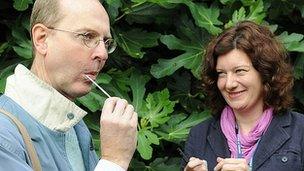Richard III dig: From cabinet-maker to kingmaker
- Published
Michael Ibsen was contacted by archaeologists who believe they have unearthed the remains of Richard III
His genetic profile holds the key to what could be one of the most remarkable archaeological stories of recent times.
Experts have, against the odds, found bones beneath a Leicester car park which fit the known details of King Richard III's death at the Battle of Bosworth in 1485.
And Michael Ibsen, a Canadian-born cabinet-maker from Paddington in London who is a descendant of Richard III's sister Anne, admits the link makes "the hair go up on my neck".
If the DNA of the battle-scarred skeleton with a twisted back proves to be a close enough match to that of 55-year-old Mr Ibsen, a chapter in history will have a new ending.
'Violent landscape'
Softly spoken and bespectacled, Mr Ibsen is a far cry from the man who, depending on opinion, was a hunchbacked child killer or noble king hacked down during a heroic last battle.

The DNA evidence was key to persuading the authorities to give the dig the go-ahead
"I was thinking about that the other day," he said. "Here am I in a peaceful time in a cabinet-making shop, when Richard died amidst this incredibly violent landscape.
"It is a strange juxtaposition, really.
"I think I got the better end of the deal: I can go out to lunch in Archway and no one tries to chop my head off," Mr Ibsen said.
Historians traced descendants of Anne of York to Mr Ibsen's mother Joy, who lived in Canada until her death in 2008.
Mr Ibsen said: "It is a really quite extraordinary thing to think about, that all the way through these 17 generations, this little bit of DNA has continued and exists within myself, my sister and my brother and my mother before she died."
The fact that a DNA profile could be matched against any remains found helped to persuade the authorities to allow a dig beneath a council car park, beneath which documents had indicated Richard might be buried.
Mr Ibsen said: "I've gone through a range of emotions. Initially it was all rather surreal and detached in a way.
"Then when they announced the discovery of the remains I was really quite stunned because here was an actual real connection, they found someone who they think is Richard III and it comes alive and real in a way it was not before.
"It's a difficult feeling to express. It made me smile inside in a way, and there was a sense of amazement as well as shock.
"But I did have a quiet think last time I was up at the site and standing right in front of the actual place where they found the remains.
"It was one of those hair goes up on the back on your neck, tingle up your spine moments, you have this connection with history. Extraordinary."
'Utterly bizarre'
The results of the DNA tests are due to be released in December but, in anticipation of a positive result, planning is already under way for what to do with the notorious king's remains.
"There are plans afoot to have some sort of funeral somewhere," Mr Ibsen said.
"I don't know details but I think they are hoping to inter him in Leicester Cathedral, but if they confirm it is indeed Richard III then there will be some sort of ceremony and it would be nice to be there.
"I find [the idea of being at the funeral] utterly bizarre.
"I almost hope somewhere along the line they dig up some more people so others can be ancestors and descendants in the same sort of way. It is going to be an extraordinary experience."